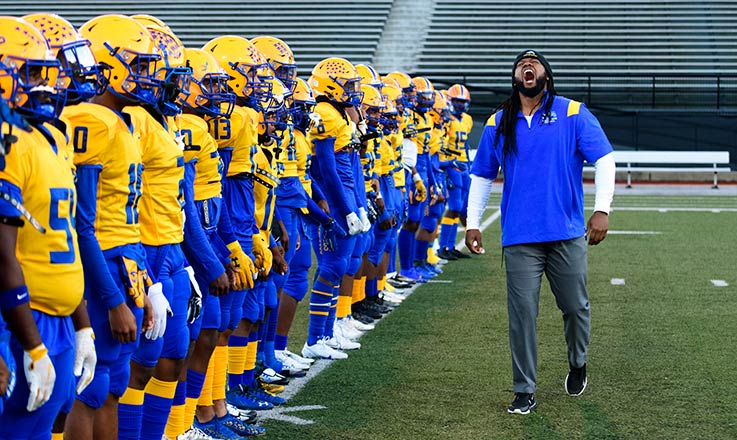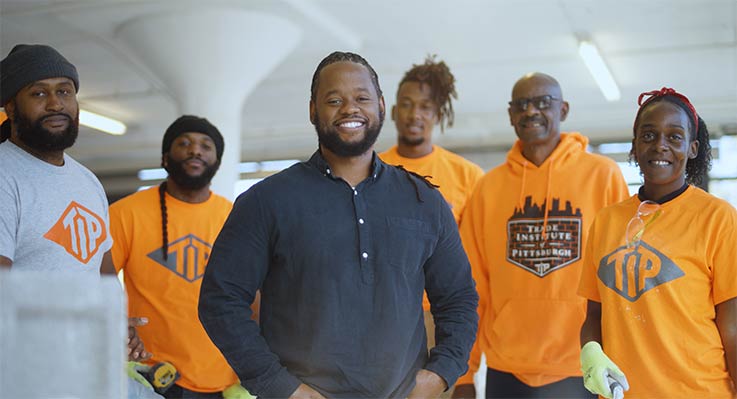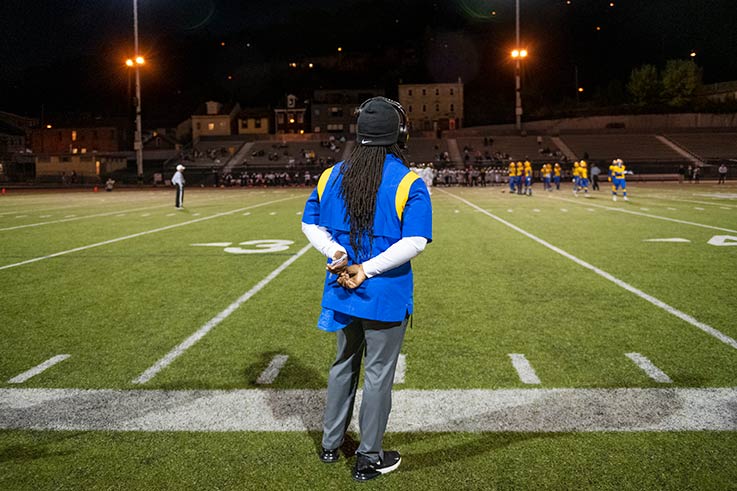Coaching Goes ‘Far beyond Football’ for Green
Donta Green won’t rest. How could he when there is so much to do?

Donta Green and the Westinghouse Bulldogs in November 2022 (Brian Henry)
He is surrounded by people and things that need his attention. Underfunded schools. People surviving in neighborhoods that are dying. Drugs and crime. He looks around and knows what he has to do. He helps, he guides, he pushes, and he pulls. His days start early. They end late.
A 2010 IUP graduate, Green by day is the executive director of the Trade Institute of Pittsburgh. Almost every other waking minute, he’s the football coach at the high school he attended, Westinghouse Academy. The two jobs are about a mile and a half apart––the institute in Homewood South and the high school in Homewood West––each in neighborhoods that are among Pittsburgh’s poorest.
“My [players] come home to a neighborhood that blight has taken over,” he said. “I have moms calling me, asking if I know anybody that has some food stamps, because they have run out of food. I have kids who don’t have a ride home from school, and they’re afraid to walk, because it’s too dangerous. Some of them wear the same clothes all week.”
Green takes their calls. He finds ways to help. He believes it’s why God put him on this earth.
“There is not a better human being on the face of the earth than Donta Green,” said IUP football assistant coach Mike Campolo ’96, who recruited Green and now counts him as one of his closest friends. “Nobody is more giving than Donta. Nobody makes time for people more than Donta. He is the definition of someone who always gives and never takes.”
Green is a devout Christian, a devoted husband, a loving father, a loyal friend, a community activist, and an inspiring motivator. That’s a long way from where he started his life’s journey.
“The hours that we put in outside football are probably the most important.”
He came from Larimer, another poverty-stricken Pittsburgh neighborhood where dreams were for other people. But after graduating from IUP, he returned to the city and now lifts up the people and places around him. He doesn’t have to think long about how his life would have turned out if he’d never made it to IUP.
“I would have ended up in jail––or dead,” he said. “If IUP didn’t take a chance on me, I probably would have ended up coming home and selling drugs. That usually ends with you being shot and killed or put in jail.”
At Westinghouse, the on-field stuff comes easy for Green, but the off-field demands are difficult. His players need him to be a father figure, a career advisor, a college connection, and a resource they can rely on for a meal or a ride home after practice. He pushes them to be better players, better students, and better citizens.
“I tell my coaches all the time that we are social workers first, and we just happen to know a little bit about football,” Green said earnestly. “I feel like God has placed me here for an assignment. I think the assignment is to do whatever I need to do to support those kids and to make sure that they’re safe and taken care of and that they’re getting the high school experience that they deserve. It’s far beyond football. The hours that we put in outside football are probably the most important.”
The Bulldogs have gone 52-8 since Green became the head coach in 2019, they’ve won four Pittsburgh City League titles, and they’ve advanced to the state championship game the past two years. The statistic he’s proudest of is the number of players he has helped get into college. As of February, it’s 29.
“The players love him, and he loves them just as much, if not more,” said the former Tonia Charles ’09, Green’s wife of 10 years.
Understanding Their World

Donta Green at his day job, with students and staff members at the Trade Institute of Pittsburgh (Emily Jaros Smith ’03, M’05)
Everyone knew Chance Battle was a talented player, but his focus in the classroom didn’t match his focus on the field. In 10th grade, he was academically ineligible to play for the Bulldogs.
Donta and Tonia Green got involved, and while Battle showed improvement, in 11th grade he was again sidelined because of academics. But the coach and his wife worked extra hours to help him catch up. And just before the team was to begin preseason camp his senior year, Battle learned he was eligible to play. He earned All-City League honors and is now a starter at IUP.
“Coach Green is an extremely important person in my life, and he’s that way for all the guys,” Battle said. “He never gave up on me.”
Green understands the world in which his players grow up. The son of mostly absent parents, he was raised in Larimer by Antoinette Hunter, a double-transplant patient who lived with her elderly parents. Initially, she was Green’s babysitter, but eventually, the days at her house turned to nights at her house, and although she didn’t legally adopt him, he called her his mom.
Conditions were rough. Until he got his first bed when he was a teenager, Green slept in a recliner. A couple times a year, the gas was shut off, because the bill went unpaid. Green didn’t use a shower until he was in college (he had taken only baths, and those were sometimes in water heated in the microwave, because the gas was turned off). When he did take a bath, first he had to place a garbage can on top of the refrigerator directly below, because the tub drain leaked, and there wasn’t money to fix it.
But Green felt loved. He and Hunter cared for one another. By the time he was in kindergarten, he was able to identify her pills and open their packaging to give her the medicine she needed following her lung and kidney transplants. He learned from those experiences that a house does not make a home. And a home is what he tries to create every day for his players at Westinghouse and students at the institute.
“The thing I love about Donta is that he isn’t loved because he is soft,” Campolo said. “He is demanding, but he is consistent, and he provides structure. The kids respond to that.”
Green remembers a time when a tree fell and crashed through Hunter’s bathroom window. The solution, because there was no other available, was to put plywood over the hole. Years later, while Green was at IUP, Hunter lost the house. He was still calling her mom when she died in 2017, leaving a hole in Green’s heart that, like that bathroom window, can’t be repaired. The house now sits abandoned, and the window is still boarded up. Sometimes Green drives by, just as a reminder of how far he’s come.
A Winding Path to IUP
In high school, Green was not a good student: he left Westinghouse with a 1.6 grade point average, but he excelled on the football field.
Despite IUP and many other colleges offering him opportunities to play, he did not have the grades to get into those schools. But, as he would do for Battle more than a decade later, Green found someone who would push him. Taunya Tinsley, who at the time worked at Westinghouse as a student advocate, implored Green to find a way to get to college.
“My job with Donta was to nourish the seed and make sure he saw what was possible,” Tinsley said. “I told him not to look at the here and now, but to look at what could be.”
“If nobody recognized him for what he does, he'd still do it.”
Green eventually made his way to Bethany College, a tiny, private Division III school in the northern panhandle of West Virginia. Bethany was only 50 miles from Pittsburgh, but to Green, it felt like a million miles. He finished the year with good grades and, because Division III schools do not offer athletic scholarships, with some debt. He came home for the summer and decided he was not going back.
Green got in touch with Campolo, who had visited him at Westinghouse the previous year. A couple weeks before the season began, he came to IUP and learned about the football program and its winning tradition. Thanks to his one year at Bethany, this time he had the grades to get in.
In three seasons, Green played 28 games at linebacker and was named all-conference after his senior season. He graduated with a bachelor’s in criminology, the first member of his family to earn a degree.
“When I look back at it,” he said, “God was telling me that IUP is where I was supposed to be.”
Committed to Helping
The Trade Institute of Pittsburgh is a nonprofit agency operating out of a reconditioned brick warehouse.
Many of the institute’s students have drugs and/or incarcerations in their backgrounds, which make it hard to find consistent work. The institute provides them with soft skills, such as résumé writing and interviewing, plus trade skills, like masonry and carpentry, so they can get work that will give them a better future. In 2021, 45 students graduated from the institute and landed decent-paying jobs. In 2022, that number rose to 77.
“I tell people all the time that these students are just older versions of the kids I have at Westinghouse,” Green said. “I feel like I am in a unique space, because I can be on the preventive side of things for those kids. If I give them the support and exposure they need, they won’t end up having to utilize a program like [the institute].”
Green has been lauded for his success in the boardroom and on the football field. In 2019, after the Bulldogs won their first City League title in more than two decades, Pittsburgh Steelers star Cameron Heyward came to the team banquet and gave Green two tickets to the Super Bowl. In 2022, Pittsburgh Magazine chose him for its 40 under 40 awards, and KDKA selected him as one of its five Hometown Heroes. He was also a recipient of the FBI Community Leadership Award, and after the past two football seasons, he has been named the Pennsylvania Football Writers’ Coach of the Year.
But awards aren’t his motivation. “If nobody recognized him for what he does,” Tonia said, “he’d still do it.”
After being best friends since they were 13, Donta and Tonia started dating a couple years after they graduated from IUP. Married since 2014, they have a daughter, Dru, and a son, Troy, and their strong foundation is built on love, compassion, and a we, not me, philosophy guided by their spirituality. When Westinghouse hired Donta, in effect it also hired Tonia, who spends her day as program director for the Center of Urban Education at the University of Pittsburgh.
“I think the beauty of our union is that we both are committed to helping,” she said. “We understand the call. We help people when they need help. If people trust my husband enough to call for help, there’s merit to that.”
It’s a life to be proud of, but Donta won’t say that in so many words.
“Am I proud of myself?” he asks, repeating the question. “That would be a bold statement.”
Tinsley, who 20 years ago pushed Green to make something positive out of his circumstances, will be so bold.
“Oh, my God, I am so proud of him,” she said. “I love what he does and who he has become.”
Where He Needs to Be

Green has served as Westinghouse’s head football coach for five seasons. (Brian Henry)
In a video, Green reads a letter from Dick’s Sporting Goods as he is surrounded by his players. He chokes up for a second and bows his head. He then reads the part about the Westinghouse football program being chosen for Dick’s 75for75 program, a distinction that comes with a check for $75,000, to fund a new weight room for the Bulldogs.
What anyone watching the video on YouTube probably doesn’t know is that, a few days before it was filmed in January 2023, Green was all but gone from Westinghouse. He had been offered a lucrative deal to take over the program at Woodland Hills High School in the eastern suburbs of Pittsburgh, and in his mind, he was “90 percent gone.”
The school had offered a dramatic salary increase for Green and all his assistants, and it was allowing him to hire eight of them, three more than he had with the Bulldogs. The school had better facilities and a higher profile than Westinghouse. It was an opportunity to move up the coaching ladder, and Green felt he was ready. Earlier that month, he sat on the bed with Tonia, and they talked it over. He mentioned the increase in salary, the better hours, the better facilities, the better job.
“In my mind, I was going through my first team speech,” Donta said. “And then she said, ‘Is that what we got into this for?’ It was like a punch in the stomach.”
He knew what she meant. There was more to do at Westinghouse.
“I was praying about it,” he said. “I said to my wife, ‘I’m not hearing anything.’ And she said, ‘Well, then you already know what to do. If God isn’t giving you the green light, he’s telling you to sit still.’”
Turning down the Woodland Hills job was a difficult phone call to make. But not long after, he got the letter from Dick’s. Rather than giving him a directive, maybe that was God’s way of answering Green’s prayer. A few weeks later, he was in New York City, a guest on ABC’s Good Morning America being interviewed about the 75for75 program.
For those hearing the story of the Bulldogs, their coach, and their community, it’s clear Donta Green is where he needs to be. All he ever wanted was a home, and he has found it. So, is he proud of himself? There’s no time for that kind of talk.
“Part of my growth as a coach,” Green said, “is being able to sit back and reflect on some of the things that I’ve done. But proud of myself? I can’t say that, because there are still kids who don’t make it in our program. There are still kids who are making bad decisions. There are still kids who just aren’t getting it academically yet. There’s just so much more work to do.”